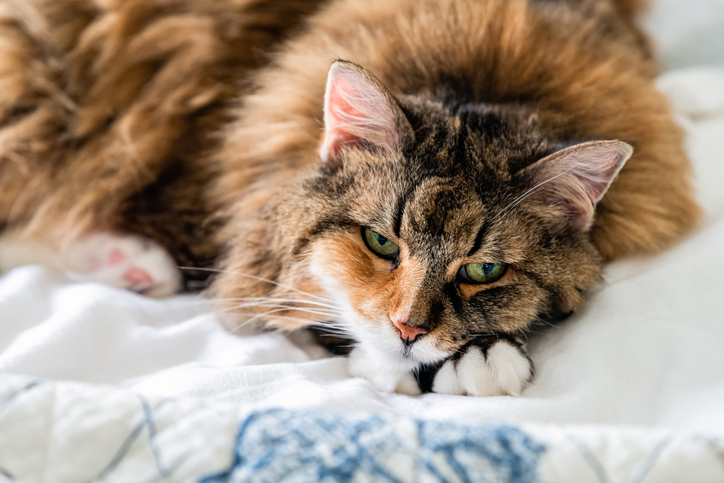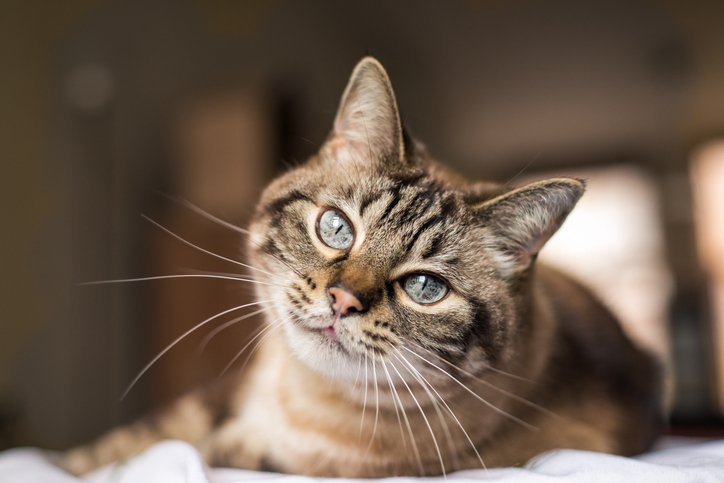
10 ways your cat will change in old age
6th October, 2021
As your beloved feline friend enters their sunset years, you’ll soon start to notice changes in their health, appearance, and behaviour. While many of these are a normal part of ageing, your cat may need some extra help and understanding. To make sure you’re well prepared, read our rundown of the 10 ways your cat will change in old age.
As well as being well-informed about these changes, having pet insurance for older cats is a great way to provide them with all-important extra protection against injury and illness. Get a quote from Petwise today and let our team guide you through the process.
-
Playing less
As cats age their energy levels decrease, muscle tone reduces, and they’ll have less interest in playing. It can be disappointing when their favourite toy no longer interests them, or they seem bored and prefer to nap. But older cats often have less need to explore their world and express their wilder instincts than when younger.
Top tip: It’s still important for their mental and physical health to make time for play. Even if it’s not as vigorous as before.
-
Eating differently
With reduced activity levels your cat might not need to eat as much as previously, so you may see a drop in appetite. However, if your previously greedy cat seems particularly off their food, it may be a sign there’s something wrong. Having the right pet insurance for older cats is a great way to cover such problems. Dental cover is included as standard on all Petwise policies.
For further guidance on how much food an old cat needs, read our recent guide.
Top tip: Older cats need easy access to food and water. So, make sure their bowls are positioned in more than one place and easy to find.
-
Hearing loss
If you notice your senior cat is no longer responding to their name, or other loud noises, then they may be experiencing hearing loss. Cats have amazing senses, so it’s all too easy for their developing deafness to go unnoticed. Other symptoms of deafness include being easily startled, loud meowing or signs of dizziness or disorientation.
It’s always worth checking if they have an ear infection. Signs of ear disease include:
- Head shaking.
- Clawing at the ear.
- Pus, discharge or an unpleasant smell from the ear.
Top tip: As your cat experiences hearing or sight loss it’s important you stick to familiar and regular routines to provide predictability. Avoid making big changes around the house, so they can easily find their way around.
-
Forgetting litter box training
Cats are well-known as fastidious animals when it comes to toileting. But if you start to find little accidents around the home then old age could be to blame. Unfortunately, a distressing symptom of ‘cognitive dysfunction’ in cats is confusion about where the litter box is.
However, be aware urinating or defecating in inappropriate places might also indicate other health conditions. These include urinary tract infections, constipation, or even eyesight loss.
Top tip: Try to make it as easy as possible for your cat to find their litter box. Install several around the house and make sure they are large and low-sided so they can easily use it. It’s also worth swapping to a softer, finer litter that’s kinder on their paws. Whatever you decide, patience and understanding are key.
-
Increased confusion or disorientation
As well as toileting problems, elderly cats experiencing cognitive dysfunction may become more vocal, appear disorientated, or experience changes in their personality. Their interaction with family members, other animals and their environment may also change.

While there’s no cure for this, it’s important to ensure your older cat feels as safe and secure as possible.
Top tip: It’s all too easy for older cats to get lost, but if they have been microchipped then it’s far more likely you’ll be quickly reunited.
-
Sleeping more or less than usual
Cats are always partial to a nap or two, and as they age this can become ever more-so. With a drop in energy levels you’ll often find an older cat looking for somewhere quiet and peaceful to snooze.
Alternatively, some elderly cats may appear to sleep less during the night, as they are sleeping more during the day. But as long as they are getting enough sleep overall, there’s probably nothing to worry about.
Top tips: Providing a variety of cosy, well-padded beds in safe, warm places is a recipe for a happy cat.
-
Difficulty grooming
An older cat may not be as flexible as they once were so won’t be able to reach all of the spots in need of regular grooming. If you notice their coat condition deteriorating then it might be time for you to give them a helping hand with a soft brush. Be aware some cats may be sensitive to being touched or groomed in certain areas if they are experiencing pain or discomfort.
Top tip: Make time for regular grooming sessions together – it’s a great way to maintain that close bond.
-
Claws no longer in tip-top shape
Cats may also experience difficulty scratching to keep their claws well maintained. Be on the lookout for claws curling round into their sensitive paw pads. Ouch!
Top tip: Provide a horizontal scratching post or one with softer material that they might find more suited to their changing needs.
-
Increased aggression
If your previously friendly cat becomes more aggressive towards you or other animals, there may be an underlying age-related cause worth investigating.
Top tip: Older cats can become very set in their ways, and have less patience for changes to their routine or new family members. Provide a space for them to go when they’re feeling stressed.
-
Age-associated disorders
There are many common health problems in older cats. These include cognitive dysfunction, arthritis, diabetes mellitus, cancer, hyperthyroidism, high blood pressure, or kidney disease.
Top tip: Arranging pet insurance for older cats means professional vet care is only ever a phone call away.
Finding pet insurance for older cats is so simple with Petwise – get a quick quote today.
Policy benefits, features and discounts offered may very between insurance schemes or cover selected and are subject to underwriting criteria. Information contained within this article is accurate at the time of publishing but may be subject to change.